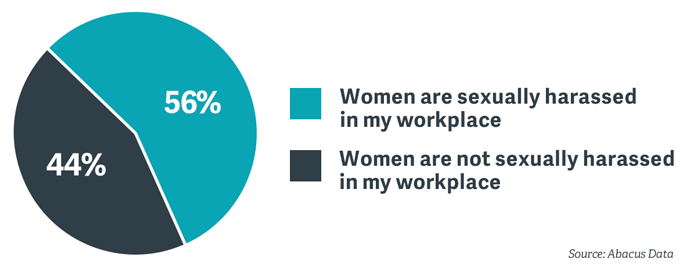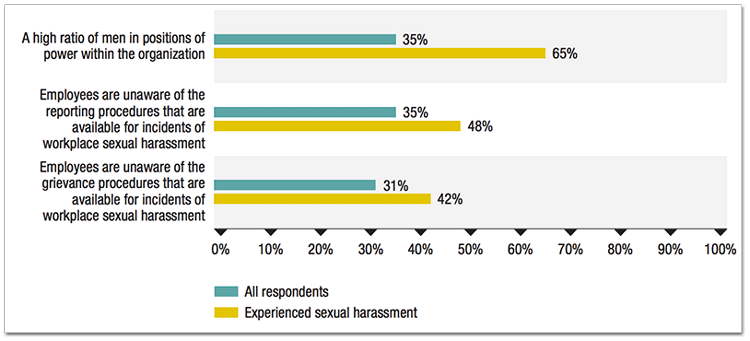
More Than Half of All Canadians Say Women Are Sexually Harassed In Their Workplace
Seven-in-ten say their bosses turn a blind eye to sexual harassment targeting women in their workplace
Most Canadians say sexual harassment is a problem in their workplace – and their bosses aren’t doing enough to stop it.
Even though employers are required by law to take action preventing and responding to sexual harassment, recent polling by Abacus Data suggests it continues to be a widespread problem in most Canadian workplaces.
Sexual harassment, defined by the Canadian Human Rights Commission as behaviours of a sexual nature or targeting a person’s sex that puts “sexual conditions on a person’s job” or “creates an intimidating, unwelcome, hostile or offensive work environment” is illegal both under human rights legislation and labour laws.
Yet 56% of all Canadians say they’re personally aware of sexual harassment occurring in their workplace – 12% describe it as “quite common.”
Even broken down by gender, 53% of men and 57% of women reported sexual harassment occurs in their workplace.

Troublingly, the survey also finds seven-in-ten Canadians say co-workers who sexually harassed women faced no consequences at all for their actions.
Broken down by gender, 63% of men said harassers face no consequences from their employers compared to 77% of women.

By law, employers have a responsibility to create harassment-free environments for their workers – some employers have been found liable for workplace cultures that create conditions enabling sexual harassment to happen in the first place.
Despite this, a report released last week by Employment and Social Development Canada (ESDC) notes that although 88% of surveyed workers “believe that employers should be responsible” for resolving incidences of sexual harassment, those complaints are most frequently resolved by unions.
This happens for a few reasons: unions negotiate anti-harassment provisions into collective bargaining agreements while rules governing non-unionized workplaces are generally subject to weak enforcement.
ESDC’s report notes a number of key factors contribute to workplace cultures that enable sexual harassment, including the following:
- Just under half of all workers told ESDC their employers do nothing to prevent sexual harassment – while three-quarters of workplaces have anti-harassment policies, 57% received no training or explanation about the policy and one-third are unaware if violating the policy carries any consequences.
- Three-quarters who reported sexual harassment at work said their complaint was either ignored, not taken seriously or someone in a position of authority retaliated against them for lodging a complaint. Overall, 41% “reported that no attempt was made to resolve the issue.”
- Those who did not report sexual harassment said their “main reason” for not reporting was “concern that their supervisor and/or employer would retaliate against them.” Others listed job security, noting workers in precarious contract jobs face particularly vulnerable circumstances.
According to women who’ve experienced sexual harassment, the “top risk factors” for workplace sexual harassment are a lack of awareness of grievance and reporting procedures, as well as organizations where most positions of power are filled by men.

Employment and Social Development Canada
Our journalism is powered by readers like you.
We’re an award-winning non-profit news organization that covers topics like social and economic inequality, big business and labour, and right-wing extremism.
Help us build so we can bring to light stories that don’t get the attention they deserve from Canada’s big corporate media outlets.
Donate



